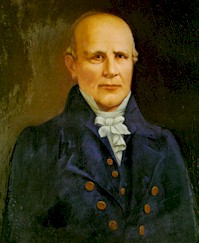Nathaniel Macon
Leader of an Agrarian State Resisting Change
See also: Macon, Nathaniel
by R. Charles Roule III
Reprinted from the Tar Heel Junior Historian, Fall 1996.
Tar Heel Junior Historian Association, NC Museum of History
 Following the War of 1812, North Carolina seemed to lapse into a “sleep” of comfort. Planters from eastern North Carolina remained perfectly content to raise crops, get them to market, and make money. The successful economy they had created was supported by a pool of enslaved laborers and a network of coastal transportation. They saw no reason to change an agriculture-based system that had worked to keep them wealthy and in control of the state since the 1700s.
Following the War of 1812, North Carolina seemed to lapse into a “sleep” of comfort. Planters from eastern North Carolina remained perfectly content to raise crops, get them to market, and make money. The successful economy they had created was supported by a pool of enslaved laborers and a network of coastal transportation. They saw no reason to change an agriculture-based system that had worked to keep them wealthy and in control of the state since the 1700s.
They were also largely “old-timers” who could remember the domineering and interfering British government. They had lived through the American Revolution (1776–1783) that ended that rule. They mistrusted big government, especially a strong federal government (which they equated to the royalty of Britain), and believed that governments should exist only to protect property, preserve order, and enforce private contracts.
A Leader That Represented Them
Because they were happy and satisfied with their lives, and because they were hesitant to increase the role of government in those lives, these eastern planters—who had basically always controlled the state’s government—supported a man who had long been a part of it: Nathaniel Macon.
Macon was a Warren County tobacco planter born in 1758, when North Carolina was still a colony ruled by the king of England. After fighting in the Revolution, he went into politics. He served first in the North Carolina Senate (1781–1785), then in the North Carolina House of Commons, then in the U.S. House of Representatives (1791–1815), where he was once speaker of the house (1801–1807), and finally in the U.S. Senate (1815–1828). Macon became known as a strong states’ rights advocate and a stout guardian of the agrarian lifestyle familiar to the planters of eastern North Carolina.
“Why depart from the good old way, which has kept us in quiet, peace, and harmony... why leave the road of experience, which has satisfied all, and made all happy, to take [a] new way, of which we have no experience?” he once asked.
North Carolina Becomes a One-party State
At the beginning of the 1800s, two political parties were rivals in North Carolina. The Federalists had been in control of the new nation from its formation until 1801, when Thomas Jefferson’s Democratic-Republican Party came into power. Jefferson’s party, once called the Antifederalists, promoted agrarian lifestyles and small government. North Carolina’s planters naturally followed these Jeffersonian philosophies.
And they followed Macon as a representative of Jefferson. Macon was a Democratic-Republican. Under the administrations of Jefferson, James Madison, James Monroe, and John Quincy Adams, Macon supported his party’s additional beliefs in a strict interpretation of the U.S. Constitution, limited national economic policies, and states’ rights. He also consistently opposed a national defense program, a national bank, and any kind of taxation or spending plan on a federal scale.
In 1814, following the end of the War of 1812, the Federalist Party lost its popularity in the state. North Carolina came to have only one political party—the Democratic-Republican Party. Elections between its competing candidates often became personality battles, not issue battles. So for the next twenty years (or until the 1935 constitutional convention changed the power structure of the General Assembly), control of the state’s government came to rest with eastern planters, Democratic-Republicans like Macon. They continued to see little reason for change.
No Changes under Macon
Macon did not want to fund public education or change the state’s electoral process, even though to do so would have allowed smaller landowners and more common people to vote for more offices. He also disagreed with the idea of having the state fund roads, canals, railroads, or other transportation improvements, known then as “internal improvements.” He insisted these improvements would not stimulate the economy, just waste money. His resistance to change and progress was particularly strong regarding internal improvements directed or funded by the federal government. Macon and the planters he represented feared northern interference, especially because of abolitionist feelings in the North. Macon said, “If Congress can make canals, they can with more [justification] emancipate [the slaves].”
Macon’s influence diminished later in his political career, but his prestige did not. Even at age seventy-seven, two years before his death, he was chosen president of the state’s constitutional convention of 1835. Following this convention, the Democratic-Republican Party began to lose its influence. Representatives from western North Carolina became the state’s new leaders and started changing the state.
At the time this article was written, R. Charles Roule III was a freelance writer and illustrator.
Image credit:
Gauley, Robert D. 1911. "Nathaniel Macon." Collection of U.S. House of Representatives. Online at http://www.learnnc.org/lp/multimedia/11370. Accessed 4/2011.
References and additional resources:
North Carolina Digital Collections
NC LIVE resources
Resources in libraries [via WorldCat]
1 January 1996 | Roule, R. Charles, III.